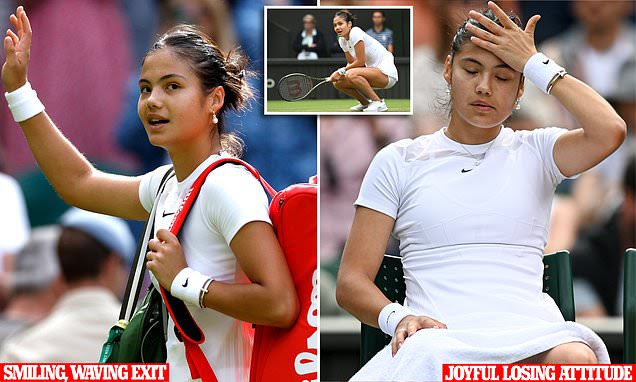
Well done, Emma Raducanu, you made it to the second round of Wimbledon before bombing out to the 55th best player in the world.
So what if you are the reigning US Open champion, Britain’s latest sporting sweetheart and carried the hopes of a Covid-battered nation on your slender 19-year-old shoulders?
So what if you bowed out with barely a whimper and walked off centre court smiling and waving in your $60,000 worth of Tiffany and Co-sponsored jewellery?
It’s all a joke, right? You said it yourself.
‘I didn’t really have many expectations of myself,’ she told media in her post-match press conference.
Which was a pity because a lot of other people did. Like the ones who had paid big money for tickets in the hope of watching her play later in the tournament. Or the TV broadcasters who paid even bigger money for the rights to show her in action late into the second week.

Or just those poor miserable sods in the UK who would have got a lift from seeing their golden girl trying her guts out, fighting tooth and nail on their behalf, like Australians did when Ash Barty won at Roland Garros, Wimbledon and Flinders Park.
Still, what do you care? You’ve already won the US Open, right? Or as you put it after your latest loss, ‘Like, why is there any pressure? I’m still 19. It’s a joke. I literally won a Slam.’
Not that anyone really should have been surprised. Ms Raducanu’s joyful losing attitude might not have pleased the traditionalists enjoying their strawberries and cream at Wimbledon, but it perfectly encapsulated the attitudes of her adoring Gen Z followers.

As an old sportswriter of the Boomer vintage, I have been noticing their insidious creep for years.
It started when my youngest daughter proudly showed me her participation ribbon after her first primary school sports carnival.
‘That’s great,’ I said. ‘Where did you come?’
She looked confused. When I explained the concept of first place, second place, third place, she told me, ‘They don’t have places. They just give us all a ribbon.’
A few years later I saw the result of the ‘every kid gets a prize’ phenomenon up close at a high level.
In the lead-up to the 2010 Delhi Commonwealth Games I had taken a particular interest in an Australian swimmer whose coach told me had the potential to be one of our best ever.

I wrote a large magazine feature about him, interviewed his family, including his grandmother. Gave him copies of articles and research information I had collected about his pet event over the years and covered his journey through the trials to selection in the national team.
When it came time for the big race, I was in the press seats at the Dr S.P Mukherjee Swimming Stadium in downtown Delhi, eager to report the arrival of the latest young Australian to follow in the wake of the likes of Kieren Perkins and Grant Hackett.
It didn’t happen. He bombed, finishing sixth in a time so far off his best as to be ridiculous.
I went down to the mixed zone to commiserate with him, but he didn’t need comforting. He was as happy as Larry. In fact, if not for the lack of Tiffany and Co diamonds, you could say his demeanour was almost Emma Raducanu-esque.
‘It’s all good,’ he told me happily. ‘I wasn’t really too worried about where I finished. Just getting in the team was a win for me.’
Six years later during the Rio Olympics I copped flak for being critical of the Australian swim team which, I suggested in a column, was becoming too accepting of failure.
The tipping point came when world champion Bronte Campbell and her world record holder sister Cate both finished out of the medals in the women’s 100m freestyle final.
Not that Bronte seemed overly devastated, telling us immediately after the race, ‘It’s not about winning at the Olympic Games, it’s about trying to win. The motto is ‘faster, higher, stronger’, not ‘fastest, highest, strongest’. Sometimes it’s the trying that matters, so everyone that got out there and pursued their dreams is a little bit of a victor tonight.’
It seemed to me at the time Bronte’s speech was so good that it might almost have been prepared and practised beforehand, just like Raducanu seemed to have her answers down pat before the questions were even asked.
And just like all those people who jumped on their keyboards to praise Bronte Campbell for demonstrating the true meaning of sportsmanship (or sportspersonship as it is no doubt now called) there has been no shortage of support for Raducanu from fans and the British media.
Which leads me to again raise the question that I asked in that column from Rio: ‘If it’s not about winning, why do they keep score and hand out medals for the fastest, highest and strongest?’
Or in Raducanu’s case, why does she think they hand out millions of dollars and Tiffany jewellery? So she can smile and wave as she leaves the court after losing?
She’s certainly getting practice at it. Since winning the US Open, she has lost 13 times – including retiring in three matches – against players ranked below her.

Yet no-one seems to care. Least of all her.
When Ash Barty crashed out in the third round at Wimbledon in 2018, she was distraught and immediately sought out Aussie sports life coach Ben Crowe to ensure it never happened again. She wasn’t one to give herself a free ride, and the Aussie media wouldn’t give her one either.
The result? She changed her mindset and won the first of her Slam titles, the French Open, in 2019.
Raducanu’s attitude is a far cry from some of the great examples of sporting grit over the years.
Who can forget an under-siege Steve Waugh hitting a four to bring up his century on the last ball of the day in the fifth Test of the 2003 Ashes at the SCG?
When his English co-commentator remarked, ‘You wonder why he didn’t just play a straight bat and get his hundred tomorrow’, former Australian Test spinner Kerry O’Keeffe answered, ‘That’s not the way we do it down here.’
Likewise Aussie runner Andrew Lloyd in the final of the 5000m at the 1990 Commonwealth Games in Auckland. Years after losing his wife in a car accident and being told he would never run again due to his injuries, Lloyd was in second place behind world record holder John Ngugi as they turned into the straight.
Summoning all his strength, he kicked and passed Ngugi on the line. Asked what he was thinking as he rounded the last turn he answered, ‘Bugger the silver. I’m going for gold.’
And then you have Barty, who fought and beat her own demons, then kept on winning until she had achieved the ultimate goal of emulating her hero Evonne Goolagong-Cawley with victory at the Australia Open.
You see, Emma? That’s what being a champion is about. Not just ‘literally winning a Slam’ and waving at the crowd for the rest of your career.
But hey, don’t let us hold you up. You go collect your participation ribbon.


























Comments 2